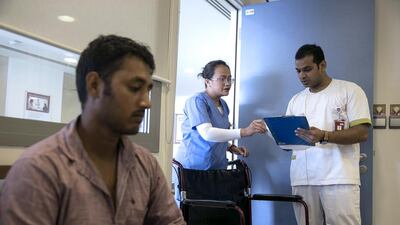The healthcare sector is expected to drive the jobs market in the UAE as opportunities dry up in the hospitality, oil and gas and banking industries.
Healthcare professionals demand increased by 12 per cent year-on-year in terms of jobs listed online at the portal Monster.com last month, according to the Monster Employment Index.
The overall jobs market declined 22 per cent year-on-year in the number of jobs listed on the portal for the UAE last month.
As crude prices remain below US$50 per barrel, the regional economy is also slowing down.
“Due to economic slowdown and uncertainty, firms are downsizing and restructuring their workforce,” according to an UAE economist. “Cost-to-income ratios have increased recently as incomes declined but cost remained the same, and now they are trying to reduce this ratio.”
Expansion of existing hospitals and construction of new hospitals to tap into the private healthcare market drive recruitment in the sector. At Monster.com, current jobs in the healthcare segment vary from physicians and nurses to sales engineers for healthcare devices and medical transcriptionists.
Among the new hospitals in the pipeline are AsterDM’s largest Medcare-branded hospital expected to open in Sharjah with 150 beds next month, and a 100-bed Aster hospital in the northern emirate next year.
“Amid an uncertain employment landscape in the UAE, healthcare continues to demonstrate strong demand for medical professionals,” said Sanjay Modi, the managing director for Asia Pacific and Middle East at Monster.com.
The consumer goods division reported 25 per cent year-on-year growth in online job posts, followed by manufacturing and automotive, and the engineering and construction sectors at 8 per cent and 6 per cent respectively.
The hospitality sector reported the steepest drop in job opportunities at 38 per cent year-on-year.
The number of hotels under construction in Dubai alone last month increased 16.8 per cent to touch 20,882 rooms across 67 hotels, the second highest in the Middle East after Mecca, according to the analytics company STR. The hotel construction is in anticipation of Expo 2020 in Dubai.
The oil and gas sector meanwhile recorded a fall of 33 per cent, and the banking and financial service sector fell 22 per cent year-on-year.
Among the hardest hit are accountants and software and hardware professionals, besides customer service personnel.
In the Arabian Gulf, Bahrain, Kuwait and Oman reported a year-on-year growth in online recruitment.
ssahoo@thenational.ae
Follow The National's Business section on Twitter

